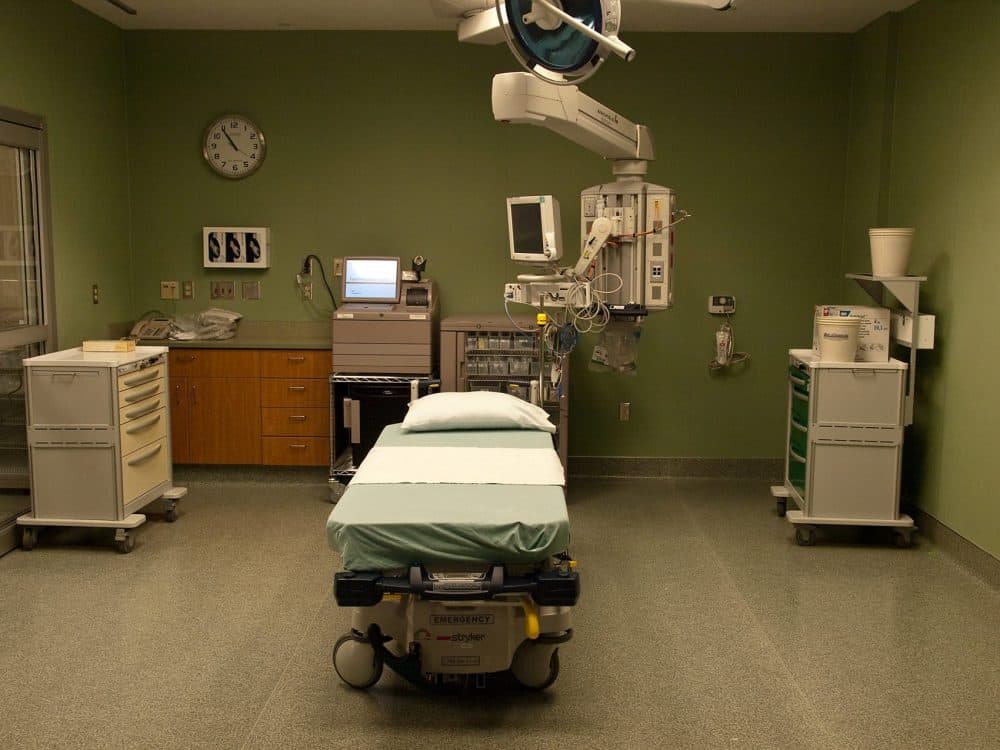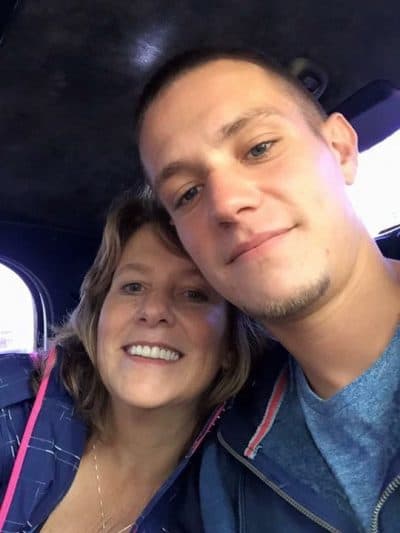Advertisement
Patients Wait Hours, Days As Demand For ER Psychiatric Beds Grows

For five straight days this spring, Patty — who doesn't want her last name used to protect her son's privacy — sought refuge in the chapel at Heywood Hospital in Gardner. That's where her 28-year-old son Eric had been waiting for a psychiatric treatment bed.
"The person that's having that breakdown is not the son that I know," Patty says. "I don't want him to see me crying over it, so sometimes I walk to the chapel and just be quiet in here."
Eric was hospitalized because Patty called for help because he had taken too many psychiatric medications.
"He overdosed on multiple medications. I had to call 911 on my own son, and now he's just waiting to go somewhere. He really really really wants treatment, but there is no place for him right now," Patty says.

Eric has been to this hospital — and others — several times and usually the wait for further treatment has been long. While he waits, Patty says, Eric gets no treatment, although he can take medications that were previously prescribed. Patty says the situation is frustrating for everyone.
"He'll lash out and he'll start throwing things and want to fight. Or he says he wants to die. He'll say, 'Go ahead call the police, I'm ready to die today.' It's really scary when you hear your son say these things like that," Patty says.
Months ago Patty did call police because Eric was out of control. She says he told the officers he had a gun.
"The police pulled a gun and I said, 'Wait, don't shoot him, he doesn't have a weapon, he's just saying that — he wants to die, he wants you to shoot him.' Then the officers realized he didn't have a weapon," Patty says. "If I wasn't there, would they have shot him? Would it have come to that? I don't know."
Advertisement
What's been most frightening for Patty is that now she's not sure if Eric has lost all hope, because he told hospital social workers that he has violent thoughts.
"They asked him about if he was feeling suicidal and he said yes. And said, 'What would you do if you had the opportunity?' And he said 'murder-suicide.' And the nurse looked at me and I looked at her and we both froze because I think we both knew it meant me."
Struggling With A Dual Diagnosis
Eric was a good student in high school — a happy kid, Patty says — involved in sports and on the honor roll. But things started to turn when he was about 18 and started drinking heavily. Patty now believes he was self-medicating an undiagnosed mental health problem.
"The alcoholism got worse and worse," Patty says. "We didn't know about the mental illness part — everyone just said he's an addict, an alcoholic — that's what he was labeled as."
For the past decade, Eric has been in and out of hospitals, treatment centers and jails. Incarceration, Patty says, made him distrust law enforcement. In treatment, Eric has usually signed himself out. In one case, Patty found out that Eric left an inpatient psychiatric treatment facility two days after he attempted suicide and was found hanging in the shower.
"He doesn't want to be that way. He didn't choose the addiction, he didn't choose the mental health. He didn't choose it."
Patty
"I found out by going through some paperwork of his when he was in the hospital," Patty says. "Every single time he's been in the hospital, he's been allowed to sign himself out against medical advice and they let him walk out the door. If they have to sedate and restrain you, they should not be opening the door the next day and letting you out."
Eric has been diagnosed with bipolar disorder, PTSD and a substance use disorder — what clinicians call "dual diagnosis" — meaning someone with both a mental health and substance use disorder. These patients often have an especially hard time accessing treatment: Most mental health facilities won't accept someone who is actively using substances, and many addiction programs won't accept someone with acute mental health issues.
Such patients also wait longer in hospital emergency rooms. A study of Massachusetts hospitals published in the Annals of Emergency Medicine showed that mentally ill patients wait hours, sometimes days, for treatment. It also found that the poorest patients — those on public insurance or without insurance — waited the longest.
"This scenario happens over and over and over again, " says Judith Shindul-Rothschild, associate professor of nursing at Boston College. Shindul-Rothschild has published research on staffing and waits in hospital ERs.
"Due to the shrinking numbers, especially for children and adolescents, of psychiatric beds, we are seeing children and adolescents — and obviously adults as well — remaining in emergency rooms for longer and longer periods of time," Shindul-Rothschild explains.
Shindul-Rothschild says the problem has been brewing for decades — starting with the closing of state mental hospitals some 50 years ago. The state, she says, never followed through on the promise of more community-based care for those with mental illness.
"We saw burgeoning numbers of individuals with chronic mental health needs in shelters or, frankly, on the streets of the commonwealth of Massachusetts, and that trend has not changed," Shindul-Rothschild says. "If anything, it's getting worse."
More Than Just A Need For Beds
Data released last year by the Massachusetts Health Policy Commission show that, between 2010 and 2014, hospital emergency rooms in the state saw a 24 percent increase in mental health and substance use patients. Despite that, UMass Memorial Medical Center in Worcester was slated to cut half of its inpatient psychiatric beds last week — but postponed the closure. The hospital says it is "continuing to work through the regulatory process."
One potential solution is the subject of a State House hearing Monday. The bill calls for creating a pilot program at Taunton State Hospital where patients could be moved from hospital ERs and get treatment while they wait for a long-term bed. State senators have also proposed adding $1 million to the state budget for placements for people who are languishing in hospital emergency departments.
But inpatient psych beds, as Eric's story shows, are just one hurdle for those with complicated mental health issues. After a month in a psychiatric unit, it's even harder to find a step-down placement. Insurance — especially state-subsidized insurance like Eric's — often doesn't pay, so those placements can cost thousands of dollars a month out of pocket.
As for Eric now, Patty says after waiting a week at Heywood Hospital, Eric was placed in a psychiatric facility. But after two weeks, he left.
"He doesn't want to be that way," Patty says. "He didn't choose the addiction, he didn't choose the mental health. He didn't choose it. I know people say that it's a choice, but it's not a choice. He's a good kid. He's sweet and he's kind, but there's something going on in his head that he can't help."
Twelve days ago Patty got a Facebook message from Eric when he used a computer at the public library, and she was able to go to court and commit him to treatment. He was taken to a Boston hospital emergency room where they were evaluating his care. While Patty was in the waiting room, Eric left the hospital. Patty filed a missing person report with police more than a week ago, but she hasn't heard from Eric since.
This segment aired on June 5, 2017.
